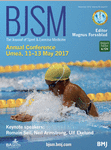 The authors of a 2014 study about asthma in Norwegian athletes have retracted it after realizing they hadn’t obtained proper approval from an ethical committee.
The authors of a 2014 study about asthma in Norwegian athletes have retracted it after realizing they hadn’t obtained proper approval from an ethical committee.
The study’s first and corresponding author of the study in the British Journal of Sports Medicine — Julie Stang from the Norwegian School of Sports Sciences in Oslo — told us the authors had struggled to obtain ethical approval for the research, but believed the issue had been resolved.
However, earlier this year, a member of an ethical committee wrote an article in the Norwegian press about his concerns regarding the study, which tested the effects of three drugs on top athletes’ breathing. In it, he said the Regional Committees for medical and health professional research ethics (REC) had not approved the study, as members were concerned the presumably healthy athletes were being exposed to drugs used to treat asthma, which could enhance their performance.
Stang has denied that the study had anything to do with boosting athletic performance.
Stein Evensen, the committee member who wrote the article, declined to comment beyond the published text. So we’ve gotten the kronikk article translated from Norwegian using One Hour Translation. It reads:
In November, 2011, the Regional Committees for medical and health professional research ethics (REC), received an application from the Norwegian School of Sport Sciences, for approval of a research project with the title “Bronchial reactivity and airway inflammation with top athletes in cross-country skiing and biathlon”.
As part of the study, the researchers exposed more than 20 athletes from Norway’s national teams (healthy and those with signs of asthma) to three drugs.
The REC rejected the researchers’ application, writes Evensen, professor emeritus at the University of Oslo:
The Norwegian School of Sport Sciences appealed the decision, which the REC rejected pointing out that it was considered quality assurance. In its refusal, the REC emphasized that all participants were subject to testing for drugs which were perceived to be for the treatment of patients with asthma, indicating an underlying purpose of the testing was the potential promotion of the athletes’ performances.
Stang, however, denied the allegations:
…this study had nothing to do with boosting performance in these athletes. [Bronchial hyperresponsiveness] and asthma is frequently reported in elite endurance athletes and we wanted to examine if increased BHR was associated to exercise-induced increased parasympathetic activity.
According to Evensen, in the end, the REC maintained its original decision, noting:
Superior appellate – the National Research Ethics Committee for Medical and Health – imposed on the REC a decision from April 2012 where the REC should consider the project as a research project, but without taking a position on the serious ethical objections the REC had to the project. When the REC re-processed the application the applicant was asked to provide supplementary information. The request by the REC has remained unanswered. The processing in the REC shows that the Norwegian School of Sports Sciences and Olympiatoppen have pressed on despite very serious warnings.
After two appeals against REC’s decisions, the case was automatically sent to the the National Ethics Committee (NEM) to deal with, and their decision was in the authors’ favor, Stang said. Last author of the study, Trine Stensrud (also at the Norwegian School of Sports Sciences), explained to us why the authors ultimately thought they had approval:
We have just written a report to the Norwegian Health Authorities where we explain that none of us have registered the last e-mail from [REC] where we were asked for supplementary information and that we by mistake thought that the study was automatically approved by NEM.
Stensrud added:
We have followed the Helsinki declaration, all participants have got written and oral information about the study and all participants signed the consent form. [In] addition, all tests were diagnostic tests for bronchial responsiveness and part of the annual airway screening procedures for the cross country skiers at the national team.
We cannot comment more on this retraction before the Norwegian Health Authorities has responded to our report.
Stang added that she’s “very sad” the paper was retracted, but noted the authors had no choice since the paper contained a false statement.
Here’s the retraction notice, published last month:
Stang J, Couto M, Carlsen K-H, et al. Increased bronchial parasympathetic tone in elite cross-country and biathlon skiers: a randomised crossover study. Br J Sports Med 2015;49:56–61. This article is being retracted on the request of the authors and with the Publisher’s consent. The article included the statement ‘Ethics approval Regional Medical Ethics committee of medical and health research ethics, South East Norway, and the Norwegian data inspectorate’, when in fact the study did not itself have approval.
The 2014 study, “Increased bronchial parasympathetic tone in elite cross-country and biathlon skiers: a randomised crossover study,” has so far been cited five times, according to Clarivate Analytics’ Web of Science, formerly part of Thomson Reuters.
Hat tip: Rolf Degen
Like Retraction Watch? Consider making a tax-deductible contribution to support our growth. You can also follow us on Twitter, like us on Facebook, add us to your RSS reader, sign up on our homepage for an email every time there’s a new post, or subscribe to our daily digest. Click here to review our Comments Policy. For a sneak peek at what we’re working on, click here.